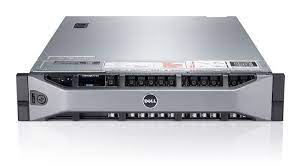Understanding of Dell PowerEdge R720

What is Dell PowerEdge R720?
The Dell PowerEdge R720 is a 2U rack-mount server manufactured by Dell Technologies. It is based on the Intel Xeon processor E5-2600 family and supports up to 768GB of memory, making it suitable for a wide range of workloads such as virtualization, databases, and high-performance computing. Additionally, the R720 supports up to 12 hard drives or solid-state drives and offers a variety of network and storage options. The server is designed for enterprise-level use and is part of Dell’s PowerEdge line of servers.
What generation is PowerEdge R720?
The Dell R720 is a 12th-generation server. It was first introduced by Dell in 2012 and was replaced by the R730 in later years.
How old is Dell R720?
PowerEdge R720 was first introduced by Dell in 2012, so as of January 28, 2023, it is around 11 years old.
What is a PowerEdge server used for?
Dell PowerEdge servers are designed for a wide range of enterprise-level workloads, such as:
- Virtualization: PowerEdge servers can be used to create and manage virtual environments, consolidating multiple physical servers into a single virtualized infrastructure.
- Database management: PowerEdge servers are well-suited for running database management systems, such as SQL Server, Oracle, and MySQL.
- High-performance computing (HPC): PowerEdge servers can be used to build HPC clusters, which can be used for scientific research, data analytics, and other compute-intensive workloads.
- Cloud computing: PowerEdge servers can be used to build private clouds, which can be used for hosting applications, software development, and testing.
- Backup and disaster recovery: PowerEdge servers can be used as backup servers or disaster recovery servers, which can be used to protect data and ensure business continuity in case of an outage.
Additionally, PowerEdge servers can be used for a variety of other purposes, including web hosting, file and print services, and email services.
Key Points of Dell PowerEdge R720
Some key points of the Dell PowerEdge R720 include:
- 12th generation server: The R720 was first introduced by Dell in 2012 as part of the 12th generation of PowerEdge servers.
- Intel Xeon processor E5-2600 family: The R720 is based on the Intel Xeon processor E5-2600 family and supports up to 768GB of memory. Making it suitable for a wide range of workloads.
- 2U rack-mount form factor: The R720 is a 2U rack-mount server. Which means it is designed to be mounted in a standard 19-inch server rack.
- Support for up to 12 hard drives or solid-state drives: The R720 supports up to 12 hard drives or solid-state drives. Providing ample storage capacity for applications and data.
- Variety of network and storage options: The R720 offers a variety of network and storage options. Including support for multiple NICs, Fibre channels, and iSCSI, allowing customers to choose the best option for their environment.
- Designed for enterprise-level use: The R720 is designed for enterprise-level use. It is part of Dell’s PowerEdge line of servers.
- Suitable for a wide range of workloads: It is suitable for a wide range of workloads. Such as virtualization, databases, and high-performance computing.
Specification of Dell PowerEdge R720
Here are some of the specifications of the Dell PowerEdge R720:
- Processor: The R720 supports up to two Intel Xeon processors E5-2600 family CPUs, with up to 8 cores per processor.
- Memory: The R720 supports up to 768GB of memory using 18 DDR3 DIMM slots.
- Storage: The R720 supports up to 12 hard drives or solid-state drives, with options for SAS, SATA, and SSD drives. It also supports RAID 0, 1, 5, 6, 10, 50, and 60, as well as optional PERC controllers.
- Networking: The R720 offers a variety of networking options, including support for multiple NICs, Fibre channels, and iSCSI.
- Expansion: The R720 has room for up to 8 PCIe expansion cards, including options for Fibre Channels, NICs, and storage controllers.
- Power supply: The R720 supports up to two redundant power supplies, with options for AC or DC power.
- Form factor: The R720 is a 2U rack-mount server, designed to be mounted in a standard 19-inch server rack.
- Management: The R720 supports Dell’s iDRAC7 remote management system, which allows for remote monitoring, management, and troubleshooting of the server.
Please note that these are general specifications and the configuration of the server can vary depending on the specific model and custom options that you choose.
The History of Dell PowerEdge R720
The Dell R720 is a 12th-generation server that was first introduced by Dell in 2012. It was part of the PowerEdge R series of servers. Which is Dell’s line of rack-mount servers designed for enterprise-level use.
The R720 was designed to offer a balance of performance, scalability, and versatility. Making it suitable for a wide range of workloads such as virtualization, databases, and high-performance computing. It was based on the Intel Xeon processor E5-2600 family. Supported up to 768GB of memory, as well as up to 12 hard drives or solid-state drives.
The R720 was well-received by customers and was widely adopted for a variety of use cases. It was also updated with new processors and other enhancements during its lifecycle.
The R720 was eventually replaced by the Dell PowerEdge R730 in later years, which is a 13th-generation server.
It is no longer available for purchase directly from Dell. However, it is still used by many companies and organizations as it is a robust and powerful server.
Dell PowerEdge R720 Versions
It was available in several different versions, each with its own set of specifications and options. Some of the versions of the R720 include:
- Dell PowerEdge R720: The base version of the R720, which supports up to two Intel Xeon processor E5-2600 family CPUs. Up to 768GB of memory, and up to 12 hard drives or solid-state drives.
- Dell PowerEdge R720xd: This version of the R720 was designed for storage-intensive workloads. Supports up to 24 hard drives or solid-state drives.
- Dell PowerEdge R720 LFF: This version of the R720 supports up to 8 large form factor (LFF) hard drives. Rather than the standard small form factor (SFF) drives.
- Dell PowerEdge R720xd with Express Flash: This version of the R720 was designed for storage-intensive workloads. Supports up to 24 hard drives or solid-state drives and Express Flash storage.
- Dell PowerEdge R720 with Intel Xeon E5-4600 v2: This version of the R720 was designed for high-performance computing. Supports up to 8 Intel Xeon E5-4600 v2 CPUs and up to 1TB of memory.
Please note that these are generic versions of the server and the configuration can vary depending on the specific model and custom options that you choose.





